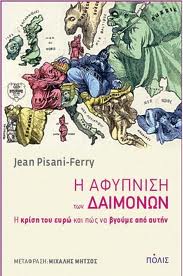Κατσίκας, Δημήτρης, (2012), ‘Η Ισχύς εν τη Πιστώσει: Η Γερμανία και το Έλλειμμα Ηγεσίας της Ευρωζώνης’, Ελληνική Επιθεώρηση Πολιτικής Επιστήμης, Τεύχος 39, Μάιος-Νοέμβριος. Οι προσπάθειες των ευρωπαϊκών κυβερνήσεων και θεσμών για την αντιμετώπιση της κρίσης χρέους έχουν αποδειχθεί αναποτελεσματικές, με αποτέλεσμα δύο χρόνια μετά την έναρξη της κρίσης να απειλείται ακόμα και η βιωσιμότητα της ίδιας της Οικονομικής και Νομισματικής Ένωσης (ΟΝΕ). Το άρθρο αυτό εξετάζει έναν από τους σημαντικότερους …Read More
Crisis and public support for the eurο
Roth, Felix, Jonung, Lars, Nowak-Lehmann, Felicitas, (2012), ‘Crisis and public support for the eurο’, www.voxeu.org, 5 Νοεμβρίου. The Eurozone crisis has meant slow growth, rising unemployment, and social unrest. This column gauges the impact of all this on European citizens‘ opinions about the euro and EU institutions. Using Eurobarometer surveys, the authors find that, within the Eurozone, the crisis has only marginally lowered support for the euro but has led to …Read More
The EMU Crisis is a Battle of Nationalism Versus Transnationalism, not Economic Prescriptions
Menenberg, Aaron, (2012), ‘The EMU Crisis is a Battle of Nationalism Versus Transnationalism, not Economic Prescriptions’, www.economonitor.com, 30 Αυγούστου. The debate over how to save the euro and the economy of its union has taken shape around economic prescriptions. On the surface this makes sense; after all, the euro is the currency for seventeen national economies.
Why a breakup of the Euro Area Must be Avoided: Lessons from Previous Breakups
Aslund Anders, (2012), ‘Why a breakup of the Euro Area Must be Avoided: Lessons from Previous Breakups’, www.iie.com, 22 Αυγούστου. One of the big questions of our time is whether the Economic and Monetary Union (EMU) will survive. Too often, analysts discuss a possible departure of one or several countries from the euro area as little more than a devaluation, but Åslund argues that any country’s exit from the euro …Read More
The Political Economy of the Crisis:The End of an Era?
Tsoukalis, Loukas, (2012), ‘The Political Economy of the Crisis:The End of an Era?’, Dahrendord Symposia Series Working Paper 2012-04. Τhe crisis we are going through will shape Europe and European integration for years to come; it also risks leading Europe down the road to disintegration. The crisis of the euro is part and parcel of a much broader crisis that has resulted from the bursting of the biggest bubble in …Read More
The Euro-Exit Taboo
Dadush, Uri, (2012), ‘The Euro-Exit Taboo’, nationalinterest.org, 1 Μαίου. Stay or leave? Should Greece persist with its extreme austerity plan, or should it abandon the euro? What about Portugal? Spain? In mainstream political discourse, posing the question of euro exit is taboo. When Prime Minister Papandreou of Greece, an ardent European, unexpectedly proposed a national referendum on the matter (one he expected adherents to the euro to win) he was …Read More
Η αφύπνιση των δαιμόνων. Η κρίση του ευρώ και πώς να βγούμε από αυτήν
Pisani-Ferry, Jean, (2012), Η αφύπνιση των δαιμόνων. Η κρίση του ευρώ και πώς να βγούμε από αυτήν, Αθήνα, Πόλις. Περίληψη Νομίζαμε ότι οι δαίμονες είχαν συνετιστεί: μετά τη χρηματοπιστωτική κρίση του 2008, τα κράτη είχαν ξαναπάρει το πάνω χέρι έναντι των χρηματοπιστωτικών αγορών· για χάρη του ευρώ, οι Ευρωπαίοι είχαν ενταφιάσει τον εθνικό εγωισμό· μπροστά σε χειρότερα πλήγματα, οι υπεύθυνοι της οικονομικής πολιτικής ήξεραν πώς να απαντήσουν και να αποτρέψουν …Read More
Saving Europe: How National Politics Nearly Destroyed the Euro
Bastasin, Carlo, (2012), Saving Europe: How National Politics Nearly Destroyed the Euro, Washington: Brookings Institution Press. Three times in the few years since the global financial crisis erupted, the euro has come close to extinction, endangering both the world economy and history’s most ambitious project in shared sovereignty. Yet each time, the case for a common currency proved to be more compelling than its weaknesses, and the euro survived. Saving Europe reveals …Read More
European Member State Elites’ Diverging Visions of the European Union: Diverging Differently since the Economic Crisis and the Libyan Intervention’
Schmidt, Vivien, (2012), ‘European Member State Elites’ Diverging Visions of the European Union: Diverging Differently since the Economic Crisis and the Libyan Intervention’, Journal of European Integration, Vol. 34, Issue 2, p.p.169-190. In the midst of the EU’s economic crisis and in the heat of the Libyan intervention, immediate concerns have seemingly crowded out consideration of the long-term issues that have been at the center of the major debates, such as …Read More
Europe’s three dimensional crisis
Brown, Gordon, (2012), ‘Europe’s three dimensional crisis’, www.guardian.co.uk, 28 Ιανουαρίου. In the rush to define Europe’s problems as fiscal, our deep-seated banking and competitiveness problems have been largely ignored. In the search for a simple, one-dimensional answer – austerity and, if that fails, more austerity – to what is a three-dimensional crisis, Europe’s leaders are failing to grasp the profound historical forces now reshaping Europe’s role in the world. For without …Read More






